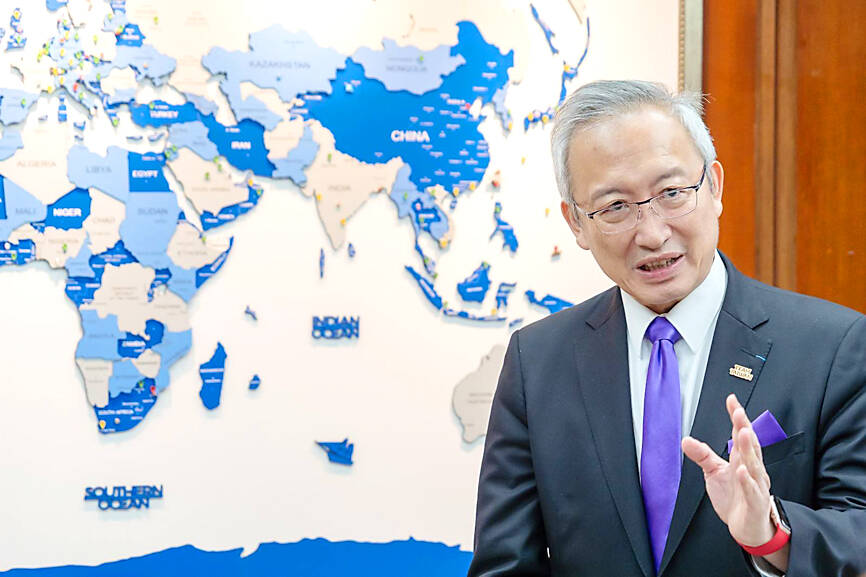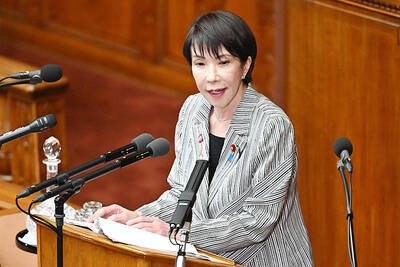France’s latest national strategy report highlighted China’s repeated military exercises around Taiwan and Beijing’s escalating pressure on Taipei as creating tensions in the region.
The 2025 National Strategic Review released on Monday said the growing sophistication and intensity of China’s military exercises around Taiwan and its continued pursuit of a fait accompli strategy in the South China Sea reflect Beijing’s ambitions to become more assertive in the region.
“In 2024 and 2025, repeated Chinese military maneuvers around Taiwan on an unprecedented scale, marked a clear acceleration in the strengthening of China’s military capabilities,” the report said.

Photo courtesy of Ministry of Foreign Affairs
The unsteadiness of US policy under US President Donald Trump has only accentuated the threat, the report said.
“The regional situation is particularly dangerous and volatile in a context marked by uncertainty over the security guarantees provided by the United States to its Asian allies and partners,” it said.
To achieve its goals, China is exploiting unprecedented hybrid actions, such as in cyberoperations and technology, in particular in defense technologies such as quantum, artificial intelligence and space technologies, it said.
It has also continued to expand its nuclear arsenal development, according to the report.
China is the only permanent member of the UN Security Council and signatory to the Treaty on the Non-Proliferation of Nuclear Weapons that has not declared a moratorium on the production of fissile material, the report said.
“Beijing is thus positioning itself to have a thousand nuclear warheads by 2030 and 1,500 by 2035,” the report said. “At the same time, China has continued to develop its ballistic capabilities (310 ballistic missile tests in 2024, firing an intercontinental ballistic missile with a claimed range of 12,000km in the Pacific from Hainan) and its strategic signaling mainly toward Taiwan and the United States.”
While the strategic review listed Russia as the main threat to France and Europeans, it said China is also eyeing French overseas territories, with an emphasis on New Caledonia due to its strategic location and nickel resources.
Strategic dependencies require France to anticipate global economic risks in any potential conflict, “as in the case of Taiwan, a key link in the semiconductor supply chain,” the report said.
That France mentions Taiwan six times in the report demonstrates that China’s expanded military presence in the Taiwan Strait is causing regional tensions and instability, the Ministry of Foreign Affairs said on Tuesday.
France’s 2022 version of the report mentioned China’s military expansion as a threat to the “status quo” in the Strait, while this year’s report devotes more attention to the threat China poses and expresses greater concern for Taiwan’s security, it said.
Minister of Foreign Affairs Lin Chia-lung (林佳龍) thanked France for its concern.
French President Emmanuel Macron and British Prime Minister Keir Starmer released a joint statement reaffirming their support of peace and stability in the Taiwan Strait at the UK-France Summit on Thursday last week, the ministry said.
Taiwan is an essential member of the Indo-Pacific region and would continue to work with France and like-minded partners to protect liberty and democracy, and safeguard regional peace and stability, it said.
Deputy Minister of Foreign Affairs Francois Wu (吳志中) wrote on Facebook that the world’s leading democratic countries all stand with Taiwan, emphasizing that “this is our shared future.”
Macron has confirmed an additional 6.5 billion euros (US$7.6 billion) in military spending to increase the nation’s defense budget to 64 billion euros by 2027, two years ahead of schedule.

The Central Weather Administration (CWA) yesterday said it expected to issue a sea warning for Typhoon Fung-Wong tomorrow, which it said would possibly make landfall near central Taiwan. As of 2am yesterday, Fung-Wong was about 1,760km southeast of Oluanpi (鵝鑾鼻), Taiwan’s southernmost point, moving west-northwest at 26kph. It is forecast to reach Luzon in the northern Philippines by tomorrow, the CWA said. After entering the South China Sea, Typhoon Fung-Wong is likely to turn northward toward Taiwan, CWA forecaster Chang Chun-yao (張峻堯) said, adding that it would likely make landfall near central Taiwan. The CWA expects to issue a land

Taiwan’s exports soared to an all-time high of US$61.8 billion last month, surging 49.7 percent from a year earlier, as the global frenzy for artificial intelligence (AI) applications and new consumer electronics powered shipments of high-tech goods, the Ministry of Finance said yesterday. It was the first time exports had exceeded the US$60 billion mark, fueled by the global boom in AI development that has significantly boosted Taiwanese companies across the international supply chain, Department of Statistics Director-General Beatrice Tsai (蔡美娜) told a media briefing. “There is a consensus among major AI players that the upcycle is still in its early stage,”

‘SECRETS’: While saying China would not attack during his presidency, Donald Trump declined to say how Washington would respond if Beijing were to take military action US President Donald Trump said that China would not take military action against Taiwan while he is president, as the Chinese leaders “know the consequences.” Trump made the statement during an interview on CBS’ 60 Minutes program that aired on Sunday, a few days after his meeting with Chinese President Xi Jinping (習近平) in South Korea. “He [Xi] has openly said, and his people have openly said at meetings, ‘we would never do anything while President Trump is president,’ because they know the consequences,” Trump said in the interview. However, he repeatedly declined to say exactly how Washington would respond in

Japanese Prime Minister Sanae Takaichi said yesterday that China using armed force against Taiwan could constitute a "survival-threatening situation" for Japan, allowing the country to mobilize the Japanese armed forces under its security laws. Takaichi made the remarks during a parliamentary session yesterday while responding to a question about whether a "Taiwan contingency" involving a Chinese naval blockade would qualify as a "survival-threatening situation" for Japan, according to a report by Japan’s Asahi Shimbun. "If warships are used and other armed actions are involved, I believe this could constitute a survival- threatening